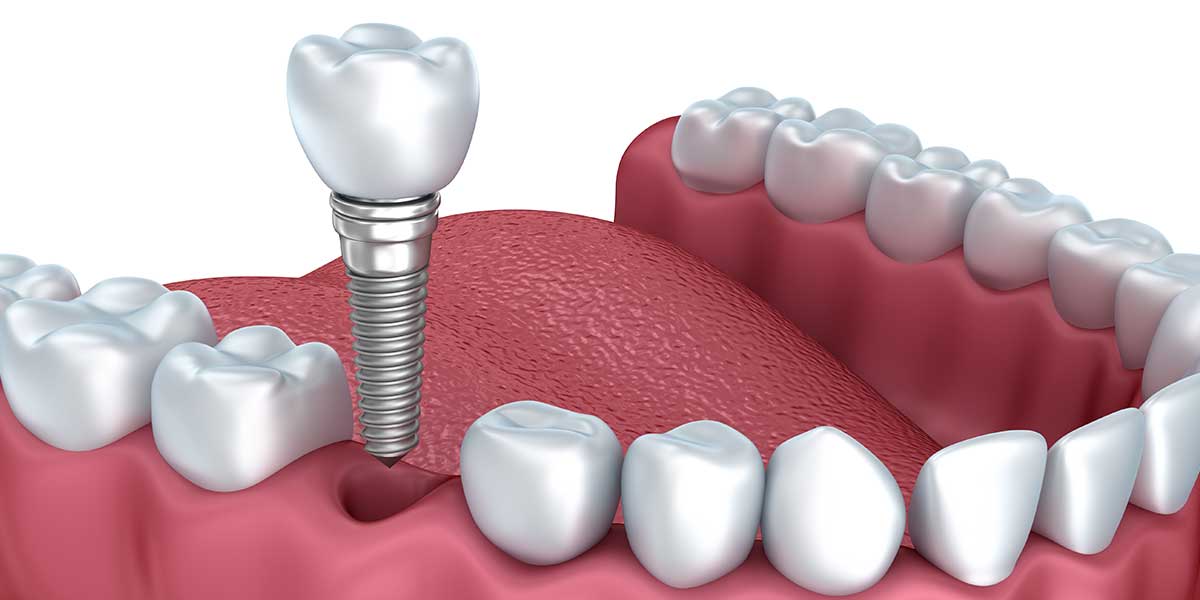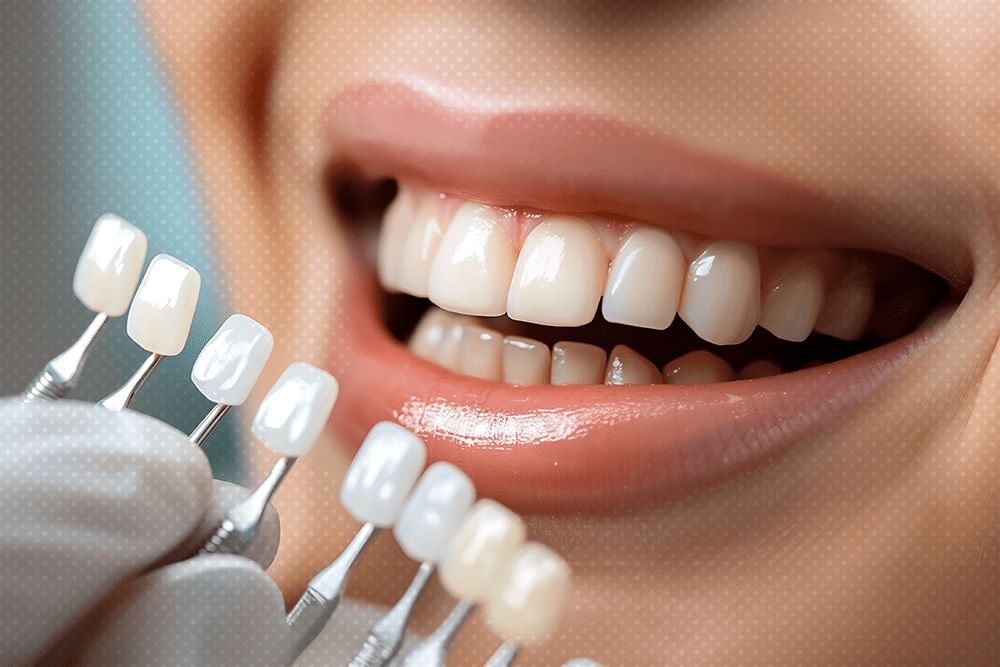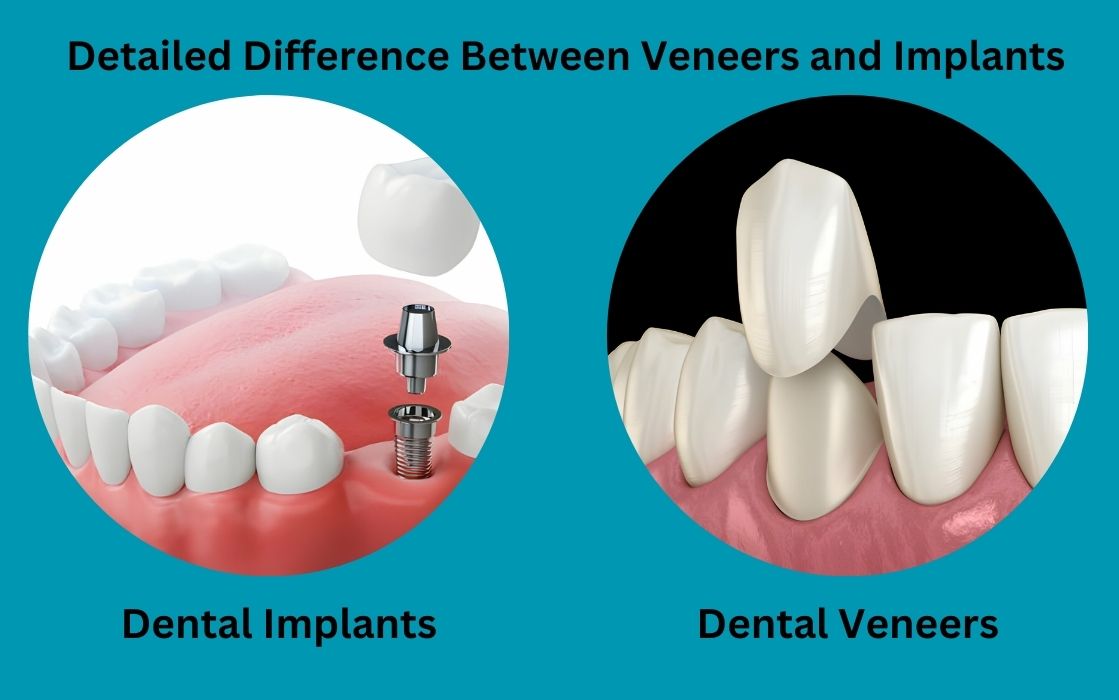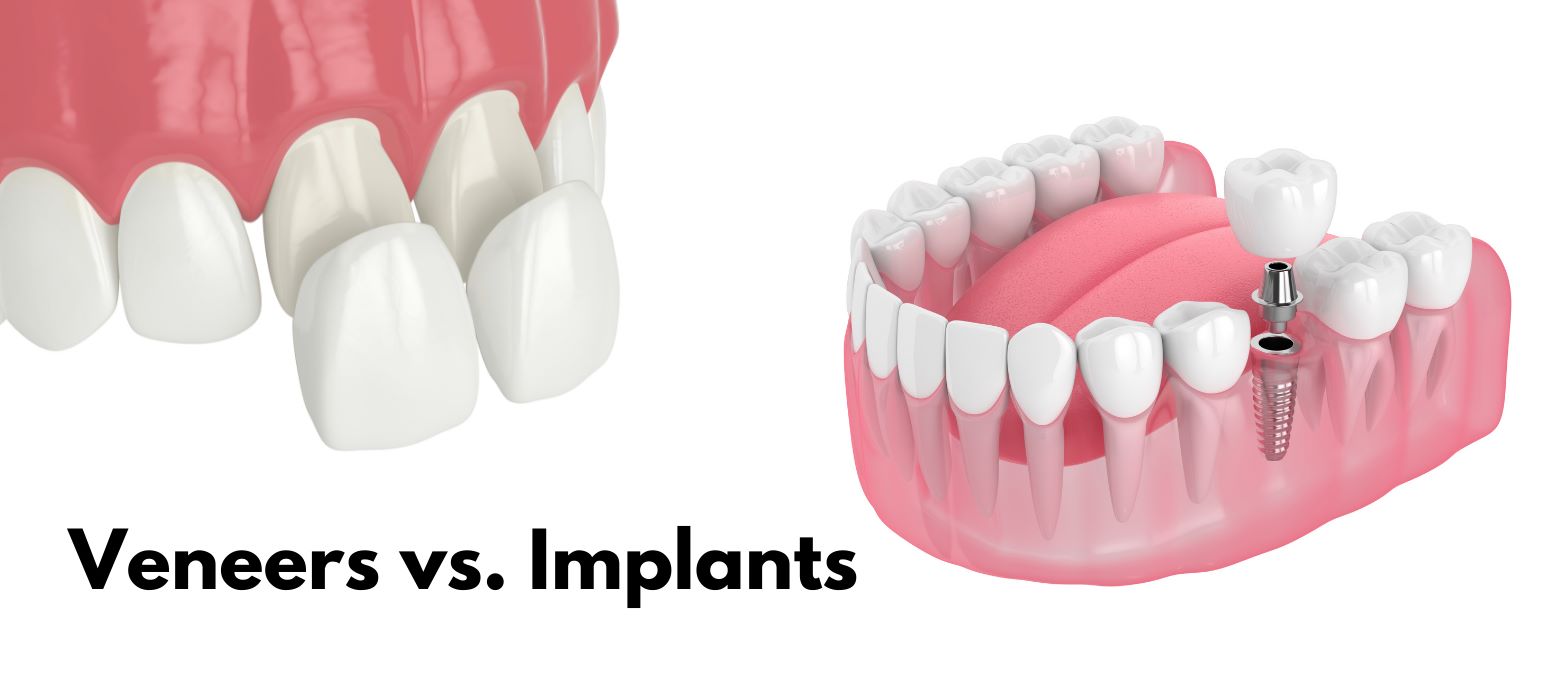Are you looking for a perfect and confident smile and wondering if dental implants vs veneers is the right route for you? Are you dealing with missing teeth that are affecting your confidence or stained, chipped teeth that are ruining your smile? There are effective cosmetic options, and each has different advantages and disadvantages.
For patients missing teeth, dental implants provide a permanent and functional replacement for missing teeth, and restore chewing function while also supporting the jawbone. Veneers are faster cosmetic options that can cover stains, chips, or small gaps for otherwise healthy teeth.
In this article, Dental Implants vs. Veneers: Which is Right for Your Smile? We will provide a thorough side by side evaluation of both types of treatments. Comparing dental implants vs veneers in terms of cost, longevity, how they are done, who is a good candidate for them, and their long term value, to help you find the best treatment for your unique dental needs and aesthetic goals.
Keep reading to find out which option is the best fit for your smile, and learn how choosing wisely now can be worthwhile later on.
What are Dental Implants?

Dental implants provide a fixed, long-term solution for patients needing to replace missing teeth. They are made of a titanium post that is biocompatible, which the dentist will surgically insert into the jawbone. After the post is healed, a permanent abutment (a small connector piece) and a custom-made crown (the visible part of the tooth) are attached to the post. Following this process, the implant is indistinguishable from the surrounding natural teeth, functionally resembling the whole tooth (from root to crown).
If you have lost a tooth due to injury, decay, age, etc., dental implants can offer you more than just a tooth. Implants will restore your chewing ability, preserve your jawbone health, and prevent other dental complications. In comparison to removable dentures or bridges, dental implants allow for greater comfort, stability, and durability, representing a preferred option for many patients in need of a permanent restoration.
Here’s a more detailed description of the dental implant process and its most significant benefits and considerations:
Benefits of dental implants:
- Durability and Longevity: If cared for correctly, implants can last a lifetime; meaning a decade (or more) of durability.
- Natural look and feel: They closely resemble your own natural teeth in form, function, and feel.
- Improved function when chewing: You can eat with confidence, without worrying about whether they will shift or if they might feel uncomfortable.
- Bone-maintaining: Dental implants will work with your jawbone when chewing, keeping the jaw bone stimulated, which in turn, prevents resorption and loss of bone that normally occurs after tooth extraction.
- Doesn’t affect adjacent teeth: Unlike a dental bridge, which attaches to adjacent healthy teeth, dental implants do not disrupt adjacent health teeth during the restoration process.
Possible Disadvantages:
- Surgical Procedure Necessary: An implant is a surgical placement that requires a typical post-op recovery.
- Lengthy Treatment Period: Complete healing and restoration of function will typically take several months.
- Increased Cost: Most implants require a more significant upfront investment than other options.
- Not Suitable for Everyone: Sufficient bone density is necessary, as well as general good health for the dentist to perform successful implant placements.
How Do Dental Implants Work?
1. Consultation
The dental implant procedure starts with an initial consultation. If your dentist determines you’re a good candidate for the treatment, the process starts. There are cases when you need additional procedures, such as bone graft, before the implant surgery.
2. Dental Implant Surgery
The second step in the dental implant process is surgery. Your dentist or oral surgeon will place a titanium post into your jawbone during this procedure. This post serves as the artificial tooth root and supports the replacement tooth.
3. Osseointegration
After surgery, osseointegration begins. This is the process where the jawbone fuses with the titanium post, creating a strong and stable foundation for the replacement tooth. This process usually takes 3-6 months.
4. Abutment Placement
Once osseointegration is complete, the abutment will be placed on top of the titanium post. The abutment serves as a connector between the post and the replacement tooth.
5. Placing the Replacement Tooth
Finally, the replacement tooth is placed on top of the abutment. Depending on your specific needs, this can be a single tooth, multiple teeth or even an entire set of teeth. Replacement teeth can be crowns, dentures or bridges.
6. Aftercare and Maintenance
After your dental implant procedure is complete, taking proper care of your new teeth is important. Your dentist will give you tips on how to care for your dental implants. These include regular brushing, flossing and visits to your dentist for check-ups and professional cleanings.
What are Dental Veneers?

Dental veneers are thin, custom-made shells usually made of porcelain or composite resin that cover the front surface of teeth to improve appearance. Veneers are direct-bonded cosmetic restorations that complete your existing smiles with only slight alteration to your natural tooth structure.
If the stains, chips, or small gaps distract from your smile and affect your confidence, veneers can offer a very cosmetic, fast option. Implants are only an option for missing teeth, whereas veneers are perfect for someone who has teeth and wants to change the shape, color, or position of the teeth they already have. A cosmetic option for those looking to remake their smile without the invasive procedures.
How dental veneers work, what they fix, and the benefits and limitations to consider:
What Conditions Can Veneers Improve?
- Tooth Discoloration: Particularly stains that do not respond to professional whitening treatments.
- Chips & Cracks: Any small structural flaws affecting the surface.
- Small Gaps: Visually closed spaces in the mouth between teeth.
- Uneven or Misshapen Teeth: Improve the aesthetic symmetry of the smile.
- Mild Misalignment: Give the illusion of straighter teeth.
Benefits of Dental Veneers:
- Aesthetic Enhancement: Instantly improve the brightness, shape, and evenness of your smile.
- Minimally Invasive: No surgery or extended downtime necessary.
- Fast Results: Transformations could take as little as two to three appointments depending on the treatment plan.
- Stain Resistant: Porcelain veneers discolor less than natural enamel.
- Natural Finish: Each veneer is made to look like real teeth in color and translucency.
Possible Disadvantages:
- Irreversibility: When enamel is taken off, it can’t be replaced.
- Longevity: Most veneers only last about 10-15 years before they will need to be replaced.
- Not for missing teeth: They only cover up the tooth, not replace it.
- Threat of damage: While veneers are strong, they can chip and crack from being hit or used incorrectly.
- Cost: If smile makeovers are done in full, they can be quite expensive.
How Do Dental Veneers Work?
The dental veneer procedure involves 2 to 3 dental visits. Here’s what you can expect during the process:
1. Consultation
Before getting dental veneers, you must schedule a consultation with your dentist. During this visit, your dentist will examine the condition of your teeth and determine if you are a good candidate for dental veneers. They will also discuss the potential risks and benefits associated with the procedure.
2. Preparation
If you are suitable for dental veneers, your dentist will prepare your teeth for the procedure. This may involve removing a thin layer of enamel from your teeth to accommodate the veneers. Your dentist will also take X-rays or impressions of your teeth to create custom-made veneers tailored to fit your teeth perfectly.
While waiting for your permanent veneers, they may place temporary veneers to protect your prepared teeth.
3. Bonding
Once the permanent veneers are ready, you must return to the dental clinic for bonding. Your dentist will clean and polish your teeth before applying a special adhesive to the veneers. The veneers are then carefully placed on your teeth, and a special light is used to activate the adhesive, bonding the veneers securely in place.
4. Follow-up
After getting dental veneers, it is important to maintain good oral hygiene practices to ensure the longevity of your veneers. Your dentist may schedule a follow-up visit to check on the condition of your veneers and make any necessary adjustments.
Dental Implants vs. Veneers: Key Differences at a Glance

Selecting dental implants or veneers is not just an aesthetic choice. It’s about choosing the right option for your dental condition, personal goals, and lifestyle. Though they can both improve your smile, dental implants and veneers have very different purposes and require very different levels of investment, procedure, and recovery.
To help navigate your decision, the table below gives a straightforward comparison to highlight the key differences that exist between dental implants and veneers:
| Category | Dental Implants | Dental Veneers |
| Purpose | Replace missing teeth (both function and appearance) | Improve the appearance of existing teeth (cosmetic enhancement) |
| Procedure | Surgical, multi-step process with healing period (3–6 months) | Non-surgical, minimal enamel removal, usually completed in 2–3 appointments |
| Longevity | Long-lasting, potentially lifelong with proper care | Last 10–15 years; may need to be replaced |
| Cost | Higher per tooth due to surgical and restorative components | Generally lower per tooth, especially for minor cosmetic fixes |
| Tooth Alteration | Replaces entire tooth structure | Requires removing a thin layer of enamel from existing teeth |
How to Choose: Which Treatment Is Right for You?
Choosing the right option among veneers and dental implants is about more than looks alone. Here are some things you should consider:
1. The “Why” (Condition of Your Teeth)
Dental Implants: These are for the “missing gaps.” If you’ve lost a tooth (root and all), an implant is a permanent replacement that acts like a natural tooth.
Veneers: These are for the “surface fix.” If your teeth are still there but look yellow, chipped, or slightly crooked, veneers act like a “facade” to give you a Hollywood smile.
2. The Investment (Cost & Value)
Upfront Cost: Implants are generally more expensive at the start.
Long-Term Value: Implants are a “one-and-done” deal—they can last a lifetime. Veneers usually need a refresh or replacement every 10–15 years, which can add up over time.
3. The “Wait Time” (Treatment Process)
Implants (The Marathon): This involves surgery and a healing period (osseointegration) that can take several months. It’s a journey, but it’s worth it for a solid foundation.
Veneers (The Sprint): Usually takes just two appointments. You walk in with your old smile and walk out a week or two later with a brand-new look.
4. Durability & Maintenance
Implants: Rock solid. They integrate with your jawbone, making them incredibly stable.
Veneers: Tough, but they are thin shells. You have to be a bit more careful with very hard foods to avoid chipping them.
Whether you are restoring missing teeth, or perfecting your smile’s appearance, it is important to understand the differences between dental implants and veneers. With implants providing functional longevity and veneers, quick cosmetic restorations, the best option for you depends on your oral health and unique goals.
If you are ready to proceed, schedule a consultation with our dental team at Aesthetic Airways where we can discuss the treatment you really want.

